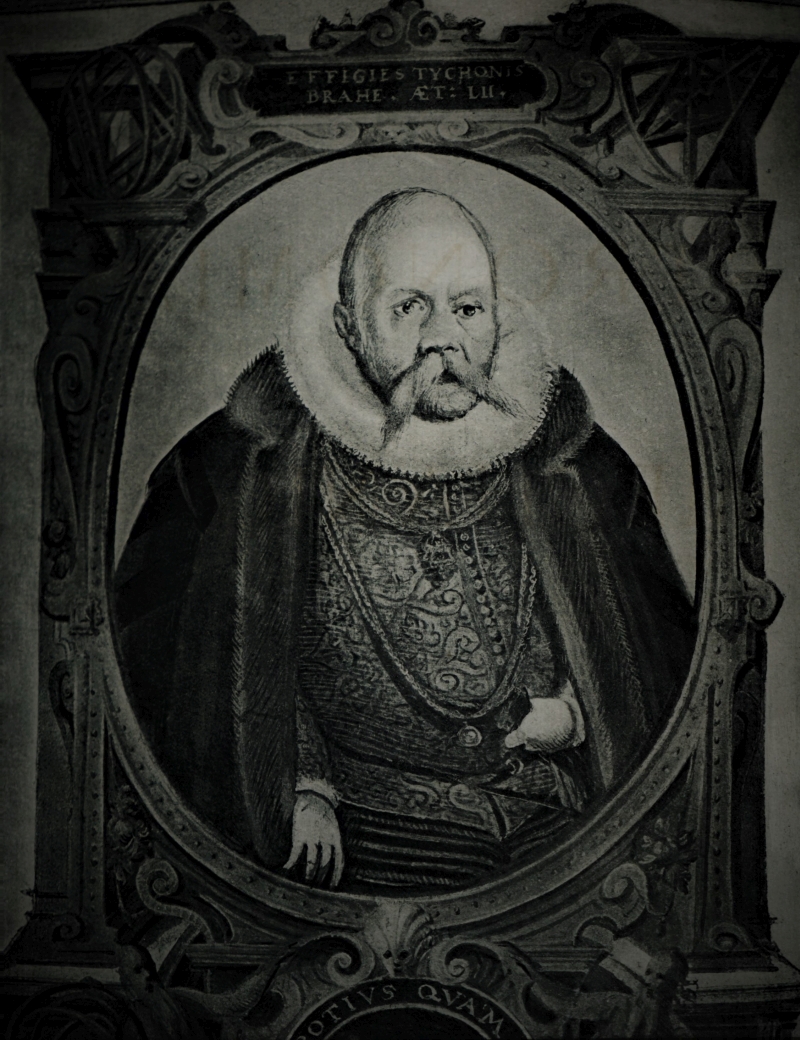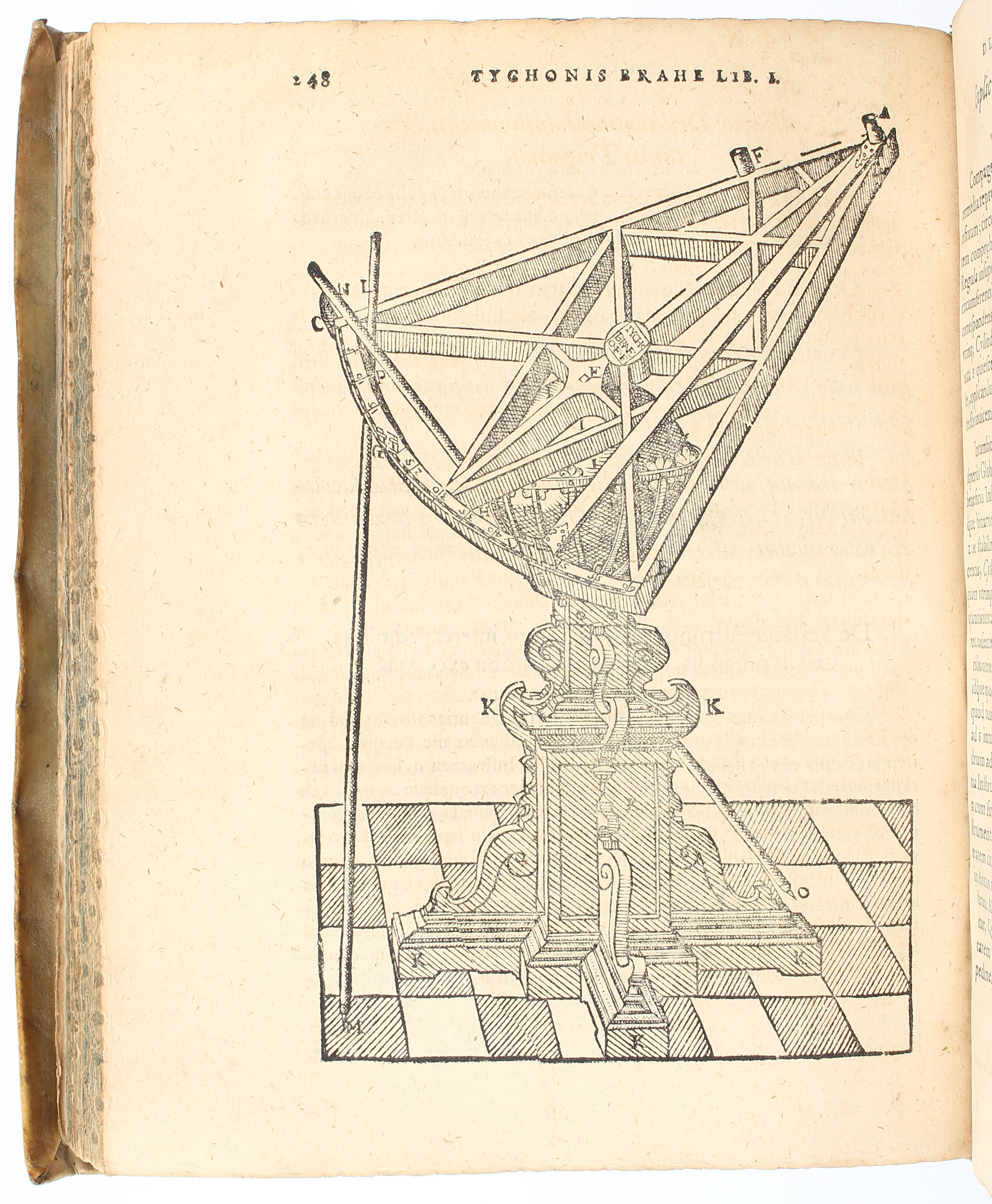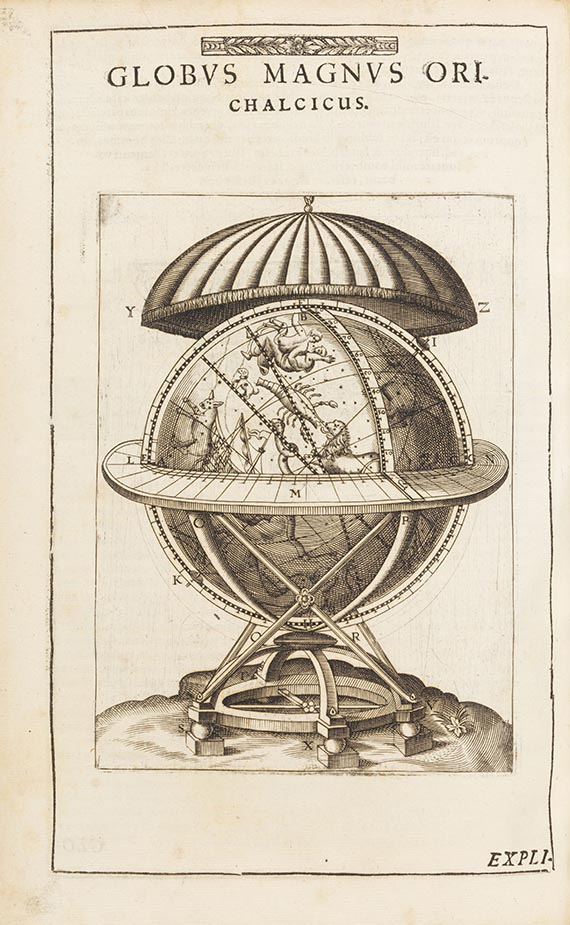BRAHE, Tycho (1546-1601). Astronomiae instauratae mechanica . Nuremberg: Levinus Hulsius, 1602. 2 o (315 x 199 mm). Title with large engraved portrait of the author standing beneath an arch hung with the arms of the families of Brahe and Bille, 6 large engravings of astronomical instruments in the text, 18 large and 7 smaller woodcuts, woodcut initials, head- and tailpieces. (Lower corner of title renewed, I2 with internal repaired tear, some occasional spotting.) Modern limp vellum from an old antiphonal leaf; cloth folding case. Second edition, first trade edition, of one of Brahe's most important works, a description of his astronomical instruments and of the observatory at Hven. In 1576, King Frederick II conferred upon Brahe the lifelong use of the island of Hven in the Danish Sound. There the astronomer constructed the most advanced astronomical observatory of his time, which he christened Uraniborg (heavenly castle); in 1584 he added a second observatory, Stjerneborg, with additional instruments in 5 subterranean rooms and a study with only the vaulted roof and the tops of the walls above ground. Brahe's brass-encased globe was housed in the library of the main building: "On this globe, over the years, Tycho marked the exact positions, referred to the year 1600, of the fixed stars that he observed... In the southwest room on the ground floor at Uraniborg... was Tycho's most famous instrument, the mural quadrant [for measuring the altitude at which celestial bodies crossed the meridian], with a radius of about six feet... Inside the quadrant's arc, for ornamental purposes, was painted a life-size portrait of Tycho seated at a table, with arm outstretched as though pointing to a cylinder..." (DSB). The two observatories and principal instruments, including the great globe, now preserved in Copenhagen, are illustrated and fully described in the present catalogue, which also contains a short autobiography and a summary of the principal results of Brahe's observations. The first edition of 1598 was printed by Philip de Ohr on Brahe's own press at Heinrich Rantzov's castle at Wandbeck, near Hamburg, where Brahe spent a year after quitting Denmark; it consisted of about 40 copies which Brahe distributed privately. With the exception of the portrait and the engraving on C6c, replacing a woodcut, the illustrations of this published edition were printed from the blocks and plates of the first edition, sold by the author's heirs to Levinus Hulsius. Dreyer, Tycho Brahe , pp. 260-264 and 370; Houzeau and Lancaster 2703; Norman 320.
BRAHE, Tycho (1546-1601). Astronomiae instauratae mechanica . Nuremberg: Levinus Hulsius, 1602. 2 o (315 x 199 mm). Title with large engraved portrait of the author standing beneath an arch hung with the arms of the families of Brahe and Bille, 6 large engravings of astronomical instruments in the text, 18 large and 7 smaller woodcuts, woodcut initials, head- and tailpieces. (Lower corner of title renewed, I2 with internal repaired tear, some occasional spotting.) Modern limp vellum from an old antiphonal leaf; cloth folding case. Second edition, first trade edition, of one of Brahe's most important works, a description of his astronomical instruments and of the observatory at Hven. In 1576, King Frederick II conferred upon Brahe the lifelong use of the island of Hven in the Danish Sound. There the astronomer constructed the most advanced astronomical observatory of his time, which he christened Uraniborg (heavenly castle); in 1584 he added a second observatory, Stjerneborg, with additional instruments in 5 subterranean rooms and a study with only the vaulted roof and the tops of the walls above ground. Brahe's brass-encased globe was housed in the library of the main building: "On this globe, over the years, Tycho marked the exact positions, referred to the year 1600, of the fixed stars that he observed... In the southwest room on the ground floor at Uraniborg... was Tycho's most famous instrument, the mural quadrant [for measuring the altitude at which celestial bodies crossed the meridian], with a radius of about six feet... Inside the quadrant's arc, for ornamental purposes, was painted a life-size portrait of Tycho seated at a table, with arm outstretched as though pointing to a cylinder..." (DSB). The two observatories and principal instruments, including the great globe, now preserved in Copenhagen, are illustrated and fully described in the present catalogue, which also contains a short autobiography and a summary of the principal results of Brahe's observations. The first edition of 1598 was printed by Philip de Ohr on Brahe's own press at Heinrich Rantzov's castle at Wandbeck, near Hamburg, where Brahe spent a year after quitting Denmark; it consisted of about 40 copies which Brahe distributed privately. With the exception of the portrait and the engraving on C6c, replacing a woodcut, the illustrations of this published edition were printed from the blocks and plates of the first edition, sold by the author's heirs to Levinus Hulsius. Dreyer, Tycho Brahe , pp. 260-264 and 370; Houzeau and Lancaster 2703; Norman 320.










.jpg)

.jpg?w=400)
.jpg)

Testen Sie LotSearch und seine Premium-Features 7 Tage - ohne Kosten!
Lassen Sie sich automatisch über neue Objekte in kommenden Auktionen benachrichtigen.
Suchauftrag anlegen